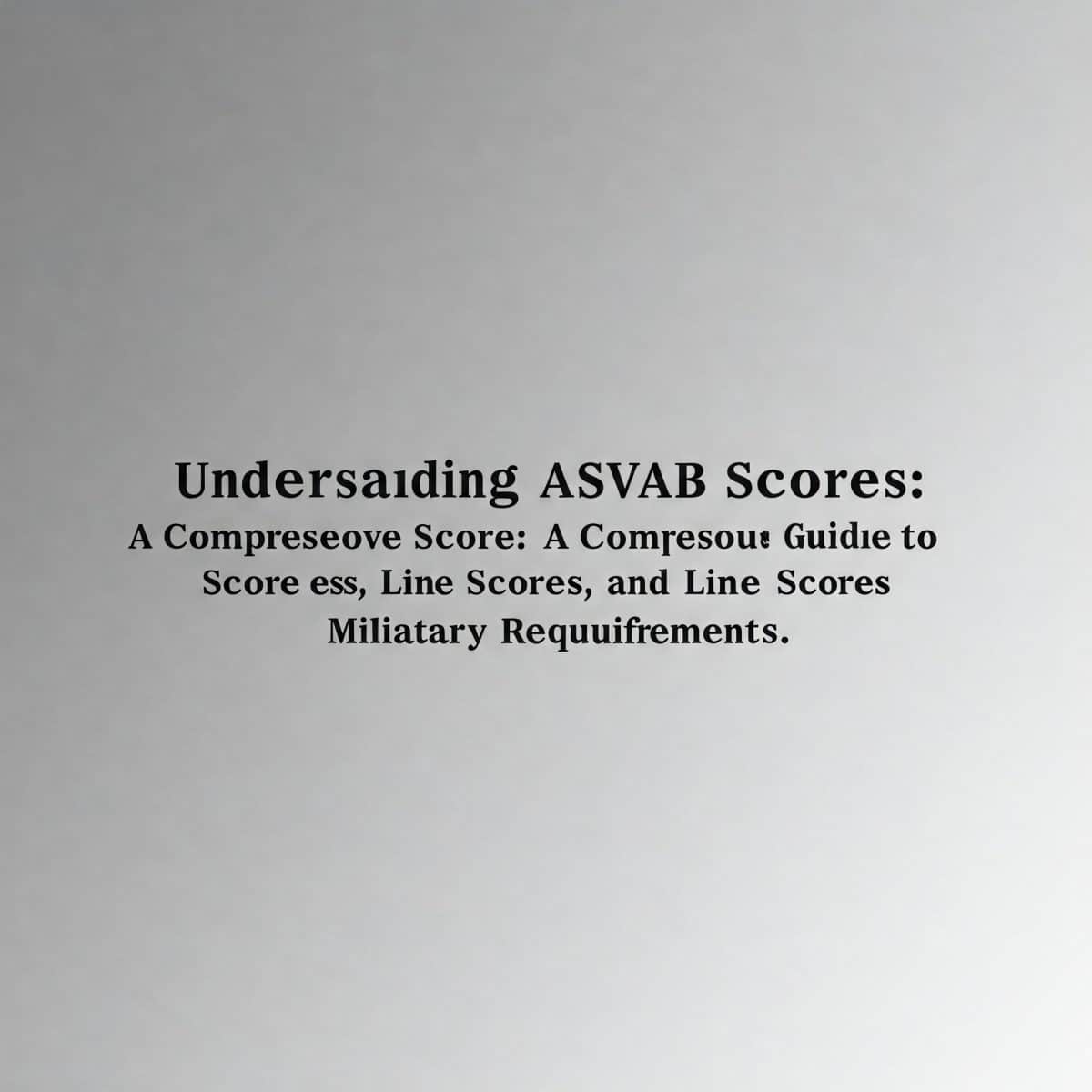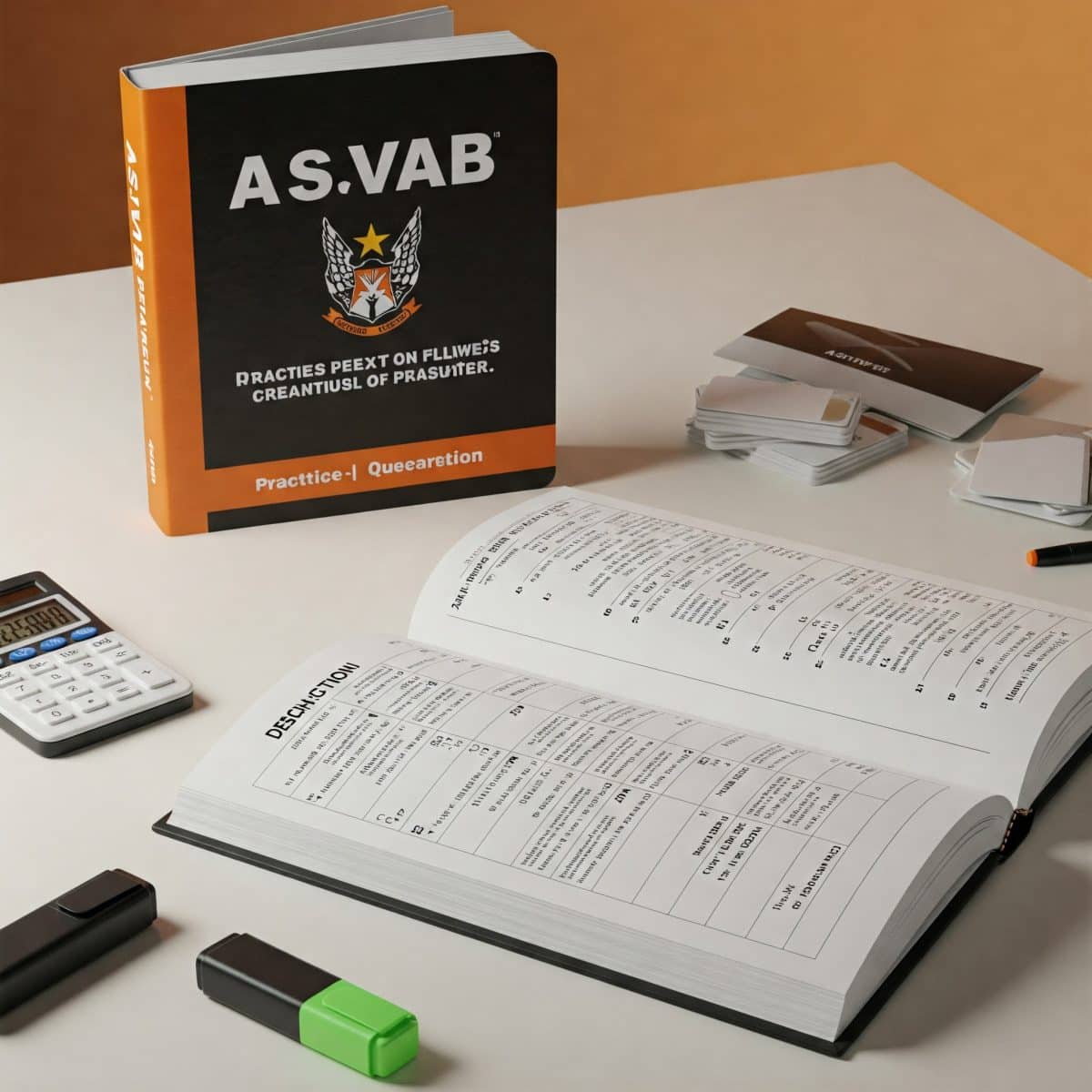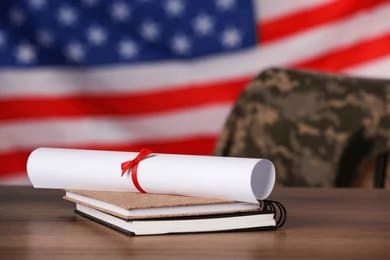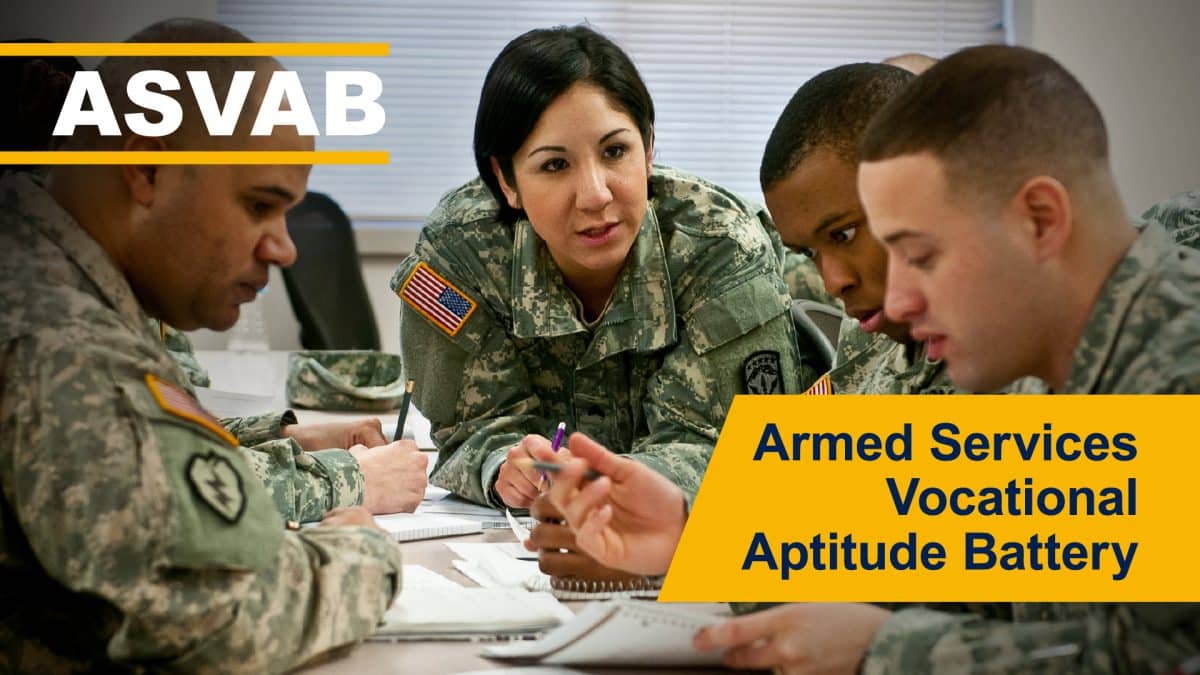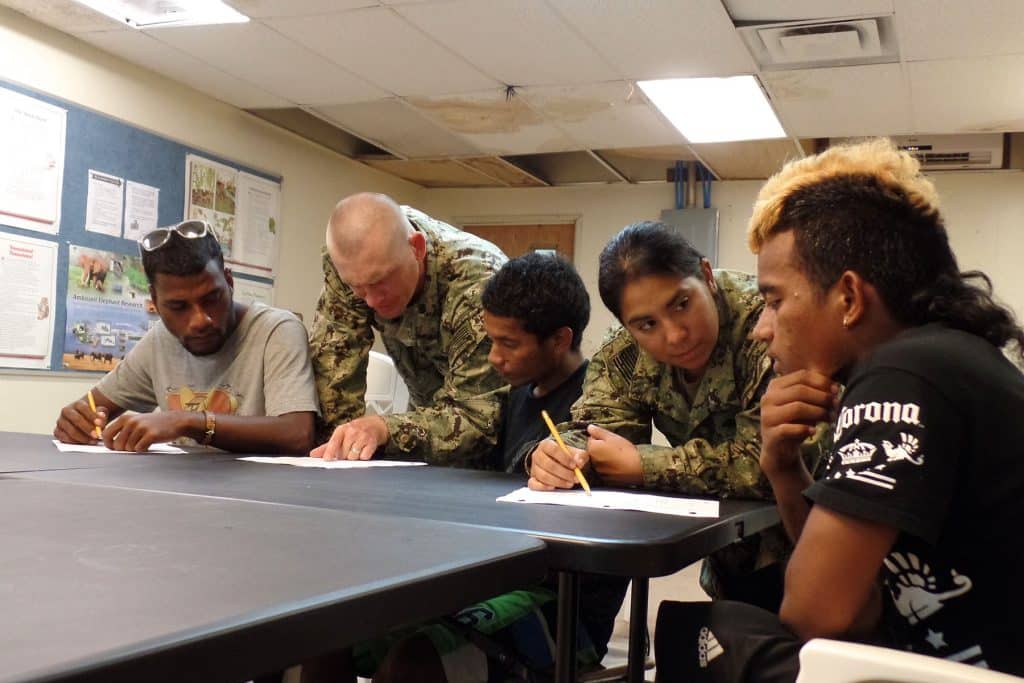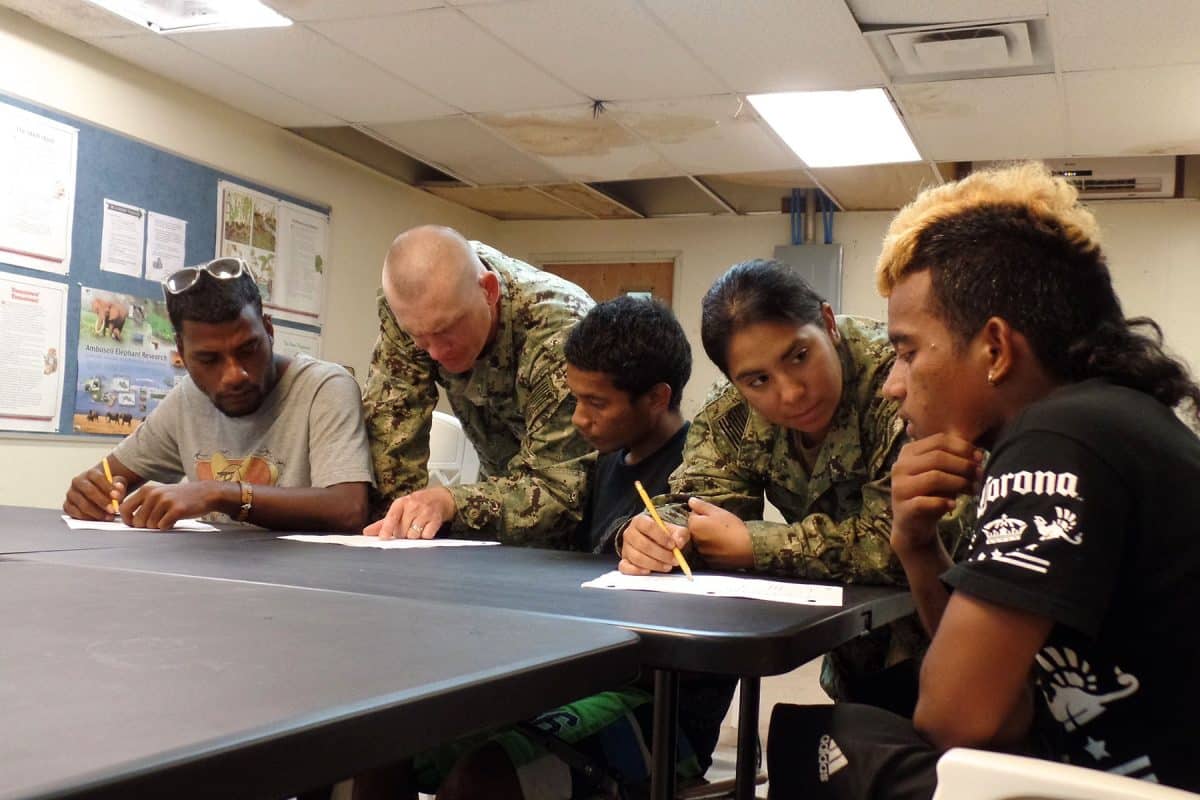Embarking on the path to a distinguished career in the U.S. Armed Forces hinges on understanding a critical acronym: ASVAB. The Armed Services Vocational Aptitude Battery (ASVAB) is more than a mere test—it’s a gateway that evaluates your potential through ASVAB scores to determine your eligibility for enlistment and guide you toward military roles that align best with your abilities.
In this comprehensive guide, we’ll cover the following topics:
- What is the ASVAB?
- ASVAB Line Scores vs Standard ASVAB Scores
- How to Read Your High School ASVAB Score Charts
- How to Read Your Enlistment ASVAB Score Chart
- Understanding the AFQT Score
- How to Raise Your ASVAB Score
- ASVAB Study Materials
What is the ASVAB?
The ASVAB, or Armed Services Vocational Aptitude Battery, is designed to assess your strengths across various areas to determine your fit for military service and to identify where your talents would be best applied in the military. The ASVAB evaluates several domains, ensuring that potential recruits are adequately prepared for the challenges of military training and operations.
The ASVAB test is divided into several subtests, each focusing on different skills necessary for a successful military career. This includes areas such as General Science, Mathematics Knowledge, and Mechanical Comprehension. A high score on the ASVAB can open the doors to advanced roles and specialized training programs within the armed forces.
Why is ASVAB Important?
For many aspiring military personnel, understanding the ASVAB is essential for both eligibility and career progression. Not only does it help determine if you qualify for enlistment, but it also plays a crucial role in matching you with the right Military Occupational Specialty (MOS).
ASVAB Line Scores vs Standard ASVAB Scores
Understanding your ASVAB test scores involves differentiating between standard ASVAB scores and ASVAB line scores.
Standard ASVAB Scores
Standard ASVAB scores represent your individual performance in each of the test’s subcategories, which include:
- General Science (GS)
- Arithmetic Reasoning (AR)
- Word Knowledge (WK)
- Paragraph Comprehension (PC)
- Mathematics Knowledge (MK)
- Electronics Information (EI)
- Auto and Shop Information (AS)
- Mechanical Comprehension (MC)
- Assembling Objects (AO)
- Coding Speed (CS)
These scores are presented as percentile rankings, ranging from 1 to 99, indicating how you performed compared to a normed group. For example, a percentile score of 70 means you scored better than 70% of test-takers.
ASVAB Line Scores
Composite scores, or ASVAB line scores, are combinations of these standard scores and directly relate to military job qualifications. Each branch of the military uses these composite scores to match you to potential roles.
For instance, the Mechanical Maintenance (MM) line score combines AS + MC + EI, qualifying you for technical positions. In contrast, the ASVAB General Technical (GT) score, derived from WK + PC + AR, is often considered for more intellectually demanding roles.
Understanding your line scores is vital, as they will help determine which military positions you are eligible for based on your strengths.
How to Read Your High School ASVAB Score Charts
Understanding how to read ASVAB scores can be confusing, especially if you’re viewing different types of ASVAB score charts. The student version of the ASVAB, administered in high schools, differs from the enlistment version typically given at Military Entrance Processing Stations (MEPS).
Student Version vs. Enlistment Version
The high school ASVAB scores reflect how your abilities compare to those of other students in your grade level. You will receive a score chart that highlights your performance across the various sections, enabling you to see how you stack up against your peers.
It’s crucial to identify the specific type of score chart you are viewing to avoid misunderstandings. If you’re unsure, don’t hesitate to reach out for help or consult the resources available on Andy’s ASVAB Class.
Key Components of the ASVAB Score Chart
- Military Entrance Score (AFQT): The AFQT score represents how well you performed in core areas compared to a reference group of test-takers. Each branch of the U.S. Armed Forces has set minimum AFQT score requirements:
- Army: Minimum AFQT score of 31
- Navy: Minimum AFQT score of 35
- Air Force: Minimum AFQT score of 36
- Marine Corps: Minimum AFQT score of 32
- Coast Guard: Minimum AFQT score of 40
- Percentile Scores: Percentile scores provide a detailed breakdown of how your ASVAB scores compare to others in your demographic. Understanding these scores is crucial when considering what constitutes a good ASVAB score and the possibilities that lie ahead.
- Standard Score Bands: These shaded areas mark the ASVAB score ranges you are most likely to fall within should you decide to retake the test, offering insights into potential improvement areas.
- Standard Score: The Standard Score compares your performance against a national baseline of young adults. Generally, scores within the 30 to 70 range are typical, with a score of 50 representing the average.
Understanding Your Enlistment ASVAB Score Chart
Once you have grasped the basics of ASVAB standard scores and composite scores, navigating the enlistment score chart should become straightforward.
The Enlistment Score Chart
This chart reflects your ASVAB standard scores in individual areas like Arithmetic Reasoning (AR) and Word Knowledge (WK), showcasing your specific skills. The chart synthesizes these scores into ASVAB line scores, which military branches use to determine your suitability for various Military Occupational Specialties (MOS).
For example, your GT score in the Army may qualify you for different positions than the same GT score in the Air Force, as each branch has unique requirements and roles.
Ultimately, your AFQT percentile score solidifies your eligibility for enlistment, determining how your performance measures up against the larger applicant pool.
Understanding the AFQT Score
The Armed Forces Qualification Test (AFQT) score is derived from a combination of your scores in specific subtests. It plays a critical role in determining your eligibility for enlistment in the military.
How the AFQT Score is Calculated
Your AFQT score is calculated using the results from the following subtests:
- Arithmetic Reasoning (AR)
- Mathematics Knowledge (MK)
- Word Knowledge (WK)
- Paragraph Comprehension (PC)
This score reflects how you performed relative to a sample of test-takers. A higher AFQT score not only increases your eligibility but also enhances your chances of qualifying for more specialized military roles.
Importance of the AFQT Score
While ASVAB line scores determine the types of jobs you are eligible for, your AFQT score is the primary measure of whether you qualify to serve in the military.
How to Raise Your ASVAB Score
Increasing your ASVAB score is essential for many aspiring military personnel. Here are some tips on how to enhance your performance on the test:
- Preparation: The key to a high ASVAB score is thorough preparation. Familiarize yourself with the test format, types of questions, and the subjects covered.
- Study Materials: Utilize available study guides and resources, such as Andy’s ASVAB Class, which offer classes, practice tests, and targeted learning materials to help you succeed.
- Practice Tests: Take advantage of practice tests to gauge your understanding and identify areas where you need improvement. This will also help you become comfortable with the testing environment.
- Focus on Weak Areas: Identify your weaker subjects and allocate more study time to those areas. Focused improvement can significantly raise your overall score.
- Join a Study Group: Engaging with peers who are also preparing for the ASVAB can provide motivation and insight, making your study sessions more productive.
- Online Resources: Consider joining online groups or forums that provide additional practice problems, tips, and encouragement. Resources like YouTube channels dedicated to ASVAB preparation can also be quite helpful.
ASVAB Study Materials
The right study materials can make a significant difference in your ASVAB preparation. Here are some recommended resources:
Free ASVAB Study Resources
- Online Classes: Register for free online ASVAB classes, including a bonus online practice test.
- Blogs and Study Guides: Read informative ASVAB blogs and guides, including Quizlet flashcards to reinforce your knowledge.
- YouTube Videos: Watch engaging and helpful ASVAB YouTube videos that break down complex topics in a fun way.
- Support Groups: Join a free ASVAB Facebook group with thousands of members sharing weekly posts with practice problems, tips, and strategies.
Recommended ASVAB Classes
To maximize your chances of success, consider enrolling in an all-access ASVAB program, which offers:
- Live classes with recorded sessions
- Practice with thousands of ASVAB questions
- One-on-one support to address your unique learning needs
- An interactive online community for additional support
By understanding the nuances of ASVAB scoring and effectively preparing, you can significantly improve your performance and align yourself with the right career path in the military. Don’t hesitate to reach out to Andy’s ASVAB Class for more information and personalized support as you embark on your military journey.
Conclusion
In conclusion, understanding ASVAB scores is crucial for anyone looking to join the military. From grasping the difference between standard and line scores to knowing the significance of your AFQT score, each aspect plays a role in your eligibility and career prospects.
With the right preparation and resources, you can raise your ASVAB score and set yourself up for a fulfilling career in the U.S. Armed Forces. Reach out to us today to learn how our classes can help you succeed!

